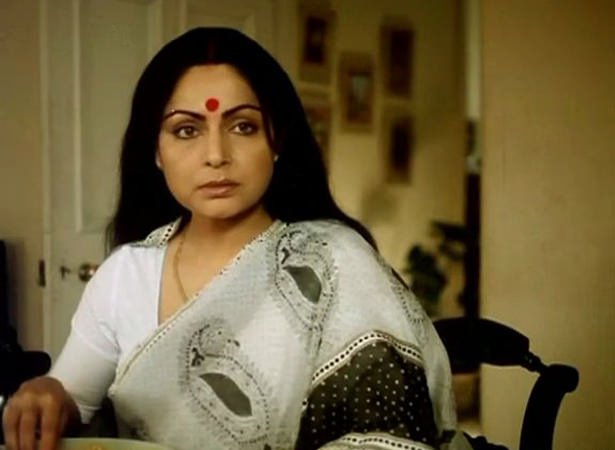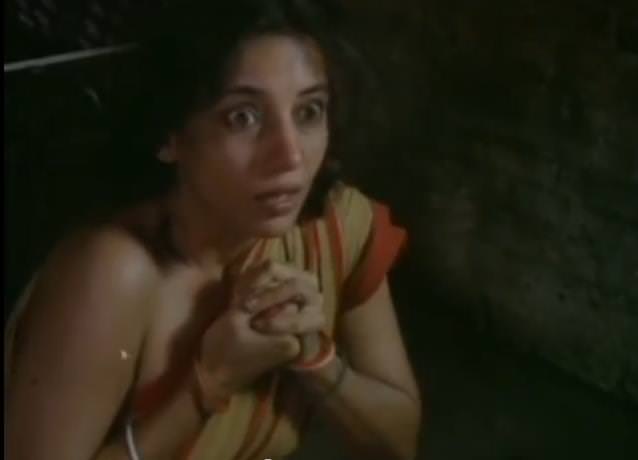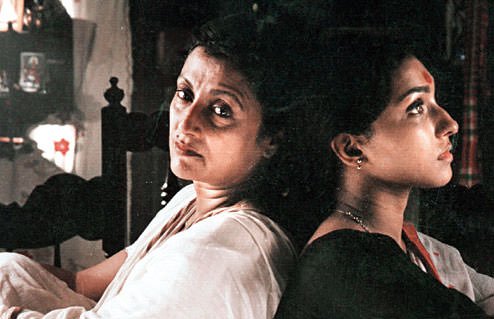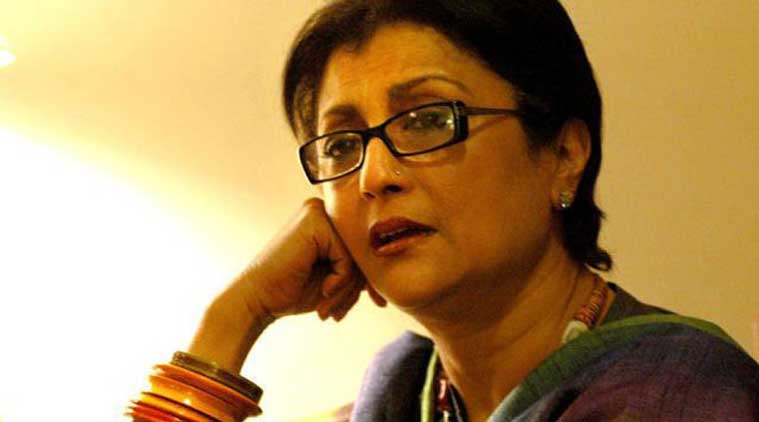Neither do I make experimental cinema, nor do I make formula films. I make films that are true to my artistic vision – Aparna Sen
Aparna Sen claims she doesn’t make films as a crusader to proliferate social messages but calls herself a storyteller, trying to portray human beings in all their complexity. The movies which she has made about women provoke society into thinking about several questions such as: are women only commodities? Are women a subject of lust? Why do we mistreat widows and disabled people?
So, without further ado, let us take a look at some of her movies:
Paroma (1984)

Image Credit: Filmfare
A lonely housewife – Paroma’s life is thrown out of gear when a young celebrity photographer Rahul, from America, chooses her for his magazine Life, to portray an Indian housewife. The assignment turns into a clandestine affair between Paroma and Rahul, who is much younger than her (I watched this movie behind closed doors as I was warned it had been rated ‘A’).
Eventually, Rahul leaves for the US for his next assignment, but he makes the mistake of sending the magazine where he had featured Paroma in a bikini, and wrote, “Remember me, love Rahul”, exposing Paroma. What follows next is Paroma’s mental agony as she is shunned by society. Unable to bear the trauma, she tries to kill herself. Rahul makes no contact with her. He vanished the same way he came, hence the million dollar question – Did he really love her or did he just use her for his magazine?
It’s only in the last quarter of the movie Paroma questions her identity after being brought from the jaws of death – Am I a commodity? Am I just a wife? Am I a daughter in law? What is my existence? She refuses to meet the psychiatrist and declares she is unapologetic for loving Rahul. Paroma is a harmony of sexuality and feminism explained in a complex and jarring way.
2. 36 Chowringhee Lane (1981)

Image Credit: Art House Cinema
The story of an Anglo-Indian teacher Violet Stoneham, played by Jennifer Kendal, who leads a reticent life in 36 Chowringhee Lane, Kolkata. Her life takes a different turn when she accidentally runs into her former student Nandita and her author boyfriend Samaresh, whom she invites to her apartment for tea. The couple finds her place perfect for their romance and asks Violet if they can live there as well.
Violet, a lovable and innocent character, trusts them. She suddenly feels an end to her loneliness through this young couple who spend time with her. But eventually, they get married and start a family of their own and no longer have time for Violet. This is a poignant tale of a melancholy soul, who has no one to hear her sorrows, no one to understand her loneliness, no one to help her and no one to listen to what she wants to convey. Yet another masterpiece by Aparna Sen.
3. Sati (1989)

Image Credit: Learning and Creativity
A heart-wrenching movie of a speech-impaired orphan young woman Sati, played by Shabana Azmi, living under the mercy of her uncle, Gangadhar, a staunch Brahmin debauch. The obtuse prediction of the horoscope has pointed out that Sati is a widow, which poses a problem for getting her younger sisters married. She spends most of her time under a Banyan tree, takes all the beatings and abuse thrown at her.
Also Read: A Feminist Reading Of Mahanagar – Satyajit Ray’s Sketch Of Middle Class Morality
Then patriarchial society goes one step further by getting her married to that Banyan tree with which she shares her agonies and also an end to her predicted widowhood. This movie was a heart-tugging watch as to how cruelly society treats widows and disabled persons.
4. Paromitar Ek Din (2000)

Image Credits: The Telegraph
There are far too many ingenious and innovative women getting married to foolish men. Paromita, played by Rituparana Sengupta, develops a strong bond with her mother in law, despite the fact the relationship between a mother in law and daughter in law is an ever complex domain.
The reason for the strong bond between the two is attributed to the fact that the mother in law deals with a Schizophrenic daughter and Paromita has a spastic son. This story is tragic but also shows a ray of hope and the power of a woman who deals with her demons despite the challenges and turns to a working woman breaking from the stereotype housewife.
It’s not possible to cover all her movies in this essay, but a few honorary mentions are a must: Mr and Mrs Iyer is about the relationship between two people from different religions in the midst of communal violence. Iti Mrinalini is a poignant tale of a woman who plans to end her life, but when she decides to try for a new beginning, she gets killed.
Reports Suman Ghosh, for The Telegraph,
Her style of storytelling blends with that general philosophy quite seamlessly. Take the example of women’s identity. I think there is no other director who has represented Indian women of different strata so convincingly — whether it is the Anglo-Indian portrayal by Jennifer Kapoor in 36 Chowringhee Lane, the Tamil Brahmin portrayed by Konkona Sensharma in Mr and Mrs Iyer or the character of a north Calcutta housewife portrayed by herself in Paromitar Ekdin. The point that I want to hone in is that it is not necessary to portray the other sex in a lesser light or depth in order to espouse woman’s identity. Again, her humanism always takes the front seat in her stories.
Aparna Sen says,
There’s a men’s club where a man can go up to a male producer and say, ‘Let’s meet over a beer’, and clinch a deal. But if a woman does that, it will be taken as a sexual advance. Nobody can take a woman for granted in the industry if she knows her job well. When I entered filmmaking, I didn’t even know what lens to use so I used to ask the cameraman to show me all. All I knew was the picture I wanted, and I approached the challenge as a student. I took the cameraman’s help and learnt my way through.
The above statement rings true with me as well, when I wanted to submit my first article, the editor (a man) wanted to sleep with me. Little did he know that I cannot be taken for granted. So when someone provokes us just say “Fuck off, no need to explain to me what I need to do”.
Take inspiration from Aparna Sen who knew nothing of making movies, and yet she did and all her movies are now appreciated worldwide. She says, “I go deep into the psyche, peel off layers one by one. All human beings are lonely at the core. We come alone, we go alone.”
Also Read: Rituparno Ghosh: Making Us Comfortable With The Uncomfortable
Featured Image Credit: The Indian Express
About the author(s)
Rimli Bhattacharya works in the corporate sector. She is also a trained Indian Classical Dancer in Kathak and Odissi. Rimli has been awarded a Star Blogger by team Bonobology for her essay “Running a solo Marathon”.



